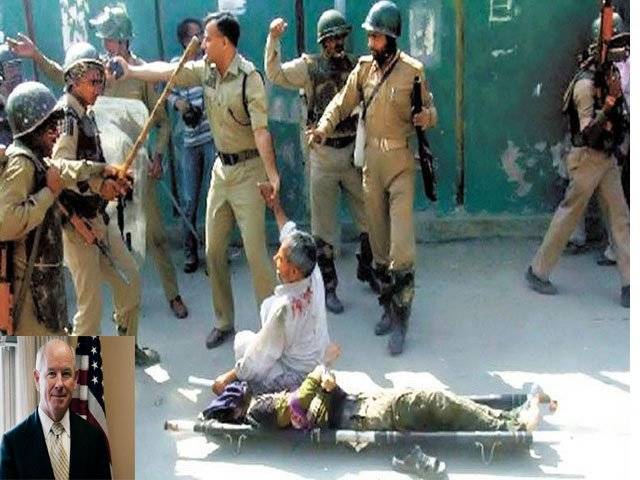WASHINGTON - Reiterating its hand-off approach on the "vitally important" Kashmir issue, the United States has said that it encourages India and Pakistan to continue with their dialogue and ultimately resolve this decade-old issue. "On the issue of Kashmir, we continue to encourage dialogue between Pakistan and India on this vitally important question. We are supporting both countries in trying to find a way to discuss this issue, and reduce tensions and ultimately resolve this issue," State Department Philip J Crowley told a news briefing on Wednesday. "Fundamentally we haven't changed our view of its importance. But ultimately this has to be an issue that is resolved first and foremost between those two countries. We will continue our dialogue with both India and Pakistan to encourage a resolution," Crowley said in response to a question. Crowley was asked to comment on the lingering issue in the light of President Obama's election pledge about the importance of resolving the Kashmir conflict and no public mention of the ongoing human rights violations in the disputed region during his recent trip to New Delhi. When asked to comment on famed Indian author and social activist Arundhati Roy's that United States' economic interests trample over issues like Kashmir, Crowley said the U.S. has multi-dimensional relations with several countries and focus on one issue does not preclude attention to other issues. "Our relations with many countries in the world have more than one dimension. We can have an economic, security, environmental, human rights dialogue with many countries from India to China, to Russia to other countries. "And so the fact that we do one thing does not preclude focus in other areas as well," he stated. On the U.S. Afghan strategy, Crowley said the Obama Administration's policy on Afghanistan is regional and that the U.S. has sought cooperation from both Pakistan and India for transition in the strife-hit country. He said that the U.S. would maintain long-term ties with the region beyond the 2014 year, when Afghan forces are expected to assume security control of their country. "Our strategy is a regional strategy and we have invited countries from Pakistan to India to engage in and support this transition in Afghanistan. That is perhaps the most significant change that we have put into effect over the last 18 months and almost two years. It's to take from being just about Afghanistan to being about the region as a whole. "We are not going to abandon the region, we are not going to abandon Pakistan or Afghanistan in 2014. We are going to engage this region over the long-term. And one of the things that will come out of the NATO Summit (in Lisbon over the weekend) is a we think a partnership declaration that will demonstrate NATO's long-term commitment to Pakistan --- we are seeking a partnership with Afghanistan, with Pakistan. As you saw with President's visit to India, we believe we are developing a strategic relationship with that country. It demonstrates our commitment to the region as a whole." He said stability in Afghanistan, promotion of Afghanistan's economic cooperation in the region, and development of institutions in that country will help transform the region and benefit both Pakistan and India.
Friday, April 19, 2024
US encouraging India, Pakistan to discuss Kashmir: Spokesman

No damage to Iranian nuclear sites after Israeli airstrikes, says UN nuclear watchdog
12:50 PM | April 19, 2024
Ch Shafay visits Directorate of Consumer Protection Council
April 19, 2024
ECP reviews arrangements for by-elections in Punjab
April 19, 2024
Punjab’s price control initiative: A welcome step
12:33 PM | April 19, 2024
A Tense Neighbourhood
April 19, 2024
Dubai Underwater
April 19, 2024
X Debate Continues
April 19, 2024
Hepatitis Challenge
April 18, 2024
IMF Predictions
April 18, 2024
Kite tragedy
April 19, 2024
Discipline dilemma
April 19, 2024
Urgent plea
April 19, 2024
Justice denied
April 18, 2024
AI dilemmas unveiled
April 18, 2024
ePaper - Nawaiwaqt
Advertisement
Nawaiwaqt Group | Copyright © 2024





